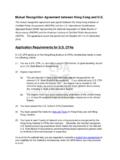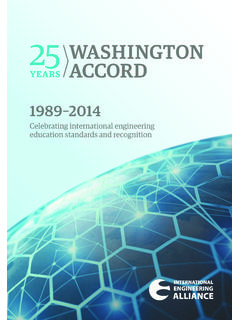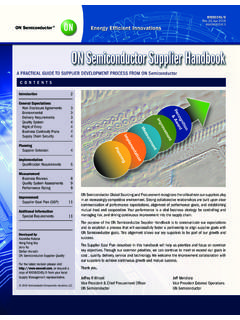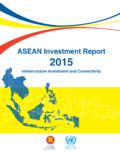Transcription of The World Trade Organisation and Southern …
1 The World Trade Organisation and Southern african Trade relations ROSALIND H THOMAS Manager: Risk Management Unit, Development Bank oj Southern AJrica 1 HISTORICAL CONTEXT Following an uninspiring attempt at regional co-operation in the 1980s, Southern african states began in the 1990s to pursue economic tion with renewed vigour, with particular emphasis on building a integration agenda. This was primarily as a consequence of developments in Europe (notably the adoption of the Treaty of Maastricht) and North America (the establishment of NAFTA between the USA, Canada and Mexico). More significantly however, political rapprochement in the Region had an even stronger influence. The emergence of a new and democratic South Africa in April 1994 and the potential resolution of regional conflicts in Angola and Mozambique lent urgency to the search in the Region for a new approach to integration.
2 In anticipation of the new South Africa, the Region had begun in 1991, to seriously reconsider its strategies for closer economic co-operation, acknowledging the importance of conSOlidating efforts to integrate their economies.' As a consequence, the Southern african Development Com-munity (SADC) was established by Treaty in August 1992, succeeding the former Southern african Development Co-ordination Conference (SADCC). Not surprisingly, in August 1994, South Africa became the eleventh member and one year later, in August 1995; Mauritius joined as the twelfth member. In 1997, two new members were admitted -the Democratic Republic of Congo and Seychelles thus bringing the mem-bership to fourte'en states each notably at different levels of development. The SADC Treaty' as adopted in 1992, is a broad enabling document, and does not create specific obligations of an economic nature for member Thus in anticipation of SOlUh african membership.
3 The Heads of State and Government of the former SADCC. meeting in Arusha in August 1991. decided to shift SADCCs focus away from the co-ordination of externally funded proJects. towards promoting economlC integration amongst the ten members. They expected South Africa to join as the eleventh member. See Waterhouse (1992) and Fauvet (1992). ANC Deputy President Walter Sisulu had pledged that a non-racial South Africa would not seek hegemony over the region, and endorsed the SADCC principles of "equity. imerdependence and mutual benefits". 2 The latter was a loose agglomeration of states. held together by a non-binding declara-tion of imem known as the "Lusaka Declaration". which had been adopted in 1980 Member states of SADC at that stage included Angola. Botswana. Lesotho. Malawi. Mo-zambique. Namibia, Swaziland. Tanzania. Zambia and Zimbabwe. 3 Treaty establishing the Southern african Development Community 32 ILM 1 16 (1993).
4 105 Reproduced by Sabinet Gateway under licence granted by the Publisher (dated 2009).LAW. DEMOCRACY &DEVELOPMENT states. These are to be spelt out in a series of protocols of which several, including those on Transport, Energy, Water Resources and Trade . have thus far been concluded. For present purposes, the most significant of these is the Trade Protocol, adopted by member states at the August 1996 SADC Summit in Maseru. The Protocol anticipates the establishment of a free Trade area (FTA) eight years after entry into force. which will occur following ratification, by eight member states. Thus far only four member states have ratified, namely: Botswana, Mauritius, Tanzania and Zim-babwe. It is anticipated that South Africa will ratify early in 1999. This attempt at regionalism should be examined against developments in the global economy, where multilateralism has seen the adoption in 1994, of a rules-based trading system and witnessed the creation of the World Trade Organisation (WTO).
5 To police Trade diplomacy. 2 THE WTO AND REGIONAL ARRANGEMENTS OF DEVELOPING COUNTRIES The cornerstone of the WTO Regime, is Article I of the GATT, upon which each WTO Member extends most-Favoured-nation (MFN) treatment to all other WTO Member States which are party to the Agreement. MFN is synonymous with non-discrimination and equal access to the markets of WTO Members. The concept of reciprocity is likewise associated with the MFN principle, and is an integral component of the concept of non-discrimination. Al-though not defined in the GATT Agreement, in Article XXVIIl bis it is clearly stated that negotiations on tariff reductions should be " .. on a reciprocal and mutually advantageous basis .. ". There is however, several exceptions to these basic commitments, in-cluding the principles of O} "non-reciprocity", which applies in respect of developing country WTO Members' Trade with developed countries; (ii) differential and more favourable treatment in the case of developing coun-tries, and (iii) regional arrangements generally.
6 Each of these is explained below. including their significance for developing countries as a whole. Non-reciprocity On 26 November J 964 a fundamental reform of the GATT legal frame-work occurred with the adoption by the Contracting Parties of Part IV of the GATT, entitled " Trade and Development". It became effective on 27 June 1966. Part IV added three articles to the GATT Agreement, namely Articles XXXVI, XXXVII and XXXVIII. The adoption of Part IV had impor-tant legal and institutional consequences. It resulted in the first substan-tive reform of a basic GATT principle that is, reciprocity of concessions, as under Article XXXVI:8, developing countries are relieved of this commit-ment. (Trebilcock and Howse 1995:35)" Thus under this Article, developed 4 Also of the old GATT. 5 See also McGovern 1995: el seq and Hudec 1987: 56-70. 106 Reproduced by Sabinet Gateway under licence granted by the Publisher (dated 2009).
7 THE World Trade Organisation AND Southern african Trade RELATIONS countries do not expect reciprocity for the commitments they make in Trade negotiations to reduce or remove tariffs and other barriers to the Trade of developing countries, An explanatory note to paragraph 8 states that developing countries should not have to make contributions which are inconsistent with their individual development, financial and Trade needs, taking into consideration past Trade developments, This principle of non-reciprocity applies not only to Trade negotiations, but also to nego-tiations under, for example, Article XVIII dealing with safeguard action for development purposes; Article XXVIlJ, dealing with modification and withdrawal of concessions in a schedule; or any other procedure under GATT, Because Part IV makes no reference at all to Article XXIV, it is argued that negotiations for a FTA are not included in this list.
8 The two GATT Panels of 1993 and 1994 on the EU's banana regime supported this contention, maintaining that the requirements of Article XXIV were not modified by Part IV.' Differentiation In November 1979. GATT Contracting Parties adopted four Tokyo Round agreements of which the Agreement on "Differential and more-favourable treatment, reCiprocity and fuller participation of developing countries". contained the provisions which make up the "Enabling Clause".' Through the "Enabling Clause" a permanent legal basis was created for preferences in favour of developing countries or among them, making them an inte-gral part of the GATT system. Thus paragraph I provides: "Notwithstanding the provisions of Article I of the General Agreement. con-parties may accord differential and more favourable treatment to de-veloping countries. without according such treatment to other contracting parties" Paragraph 2 sets out the following areas of application: (al "Preferential tariff treatment accorded by developed contracting parties [Q products originating In developing countries in accordance with the GSP"; (bl "Differential and more-favourable treatment with respect to the provisions of the General Agreement concerning non-tariff measures governed by the provisions of Instruments multilaterally negotiated under the auspices of the GATT"; (c) "Regional or global arrangements entered into amongst less-developed contracting parties for the mutual reduction or elimination of tariffs and, in accordance with criteria or conditions which may be prescribed by the contracting for the mutual reduction or eliminatIOn or non-tariff measures on products imported from one another".))]
9 6 GATT Panel Report 1993: par 369 and GATT Panel Report 1994 par 159. This issue will be revisited below in sections 3 and 4. 7 An important series of events helped to create the favourable conditions for this corning of minds, The period J 97 J to 1979 had brought with it economic disturbances and shifts in the relationship between developed and developing countries, 011 crises, economic decline. political tension in the UN and greater recognition of interdependen-cies All of these events highlighted the urgency for faster economic development and expansion in developing country exports 107 Reproduced by Sabinet Gateway under licence granted by the Publisher (dated 2009).LAW, DEMOCRACY &. DEVEWPMENT (d) "Special treatment of the least developed among the developing countries in the context of any general or specific measures in favour of developmg countries" Paragraph 2 is not exhaustive, thus a note to the paragraph explains that Contracting Parties may examine any proposal for differential and more favourable treatment, In terms of paragraph 3, differential treatment is designed to promote the Trade of developing countries without raising barriers to the Trade of other member countries, and must not prevent the reduction and elimination of customs duties or other Trade restrictions on an MFN basis, In addition, preferential treatment should be designed, and if necessary, modified to meet the needs of developing countries, [Long 1987.]
10 1 02] Even though the "Enabling Clause" provides a permanent legal basis for the granting of for developing countries, it does not define "developing" country sratus, nor does it say what countries qualify for such preferences, Under GATT practice, the system of self-selection ap-plies, Thus, which countries fall within the category of eligible states, is an open question," The principal justification for granting preferences under the "Enabling Clause" is the contention that treating equally those states that are une-qual would be unfair. Implicit in the heading "Differential and more favourable treatment, reciprocity and fuller participation of developing countries", is the notion that developing countries would, with the contin-ued and successful development of their economies, graduate to a more developed status. They would then be able to "participate more fully in the framework of rights and obligations under [he General Agreernenr",IO The notion of "fuller participation" by developing countries is the com-plement of "differential and more favourable treatment", [Long 1 987: 1 02] It provides the basis for a potential reversal of the entitlement to differen-tial and more favourable treatment, at least in respect of the more ad-vanced countries.
















